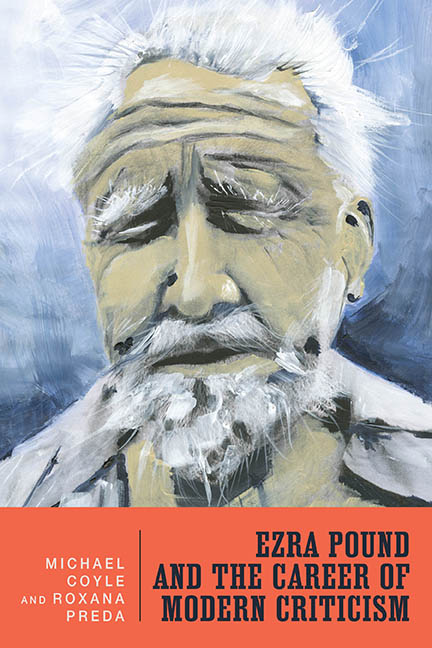Book contents
- Frontmatter
- Dedication
- Contents
- Preface
- Acknowledgments
- 1 From Wabash to Washington, 1907–1947
- 2 A Prize Fight and Institutionalization, 1948–1951
- 3 Kenner, Watts, and Professional Attention, 1951–1961
- 4 Sailing after Knowledge, 1962–1971
- 5 The Pound Era and Its Monumental Companion, 1971–1985
- 6 Pound Studies and the Postmodern Turn, 1980–1990
- 7 Reading Pound in the New Millennium, 1990–2016
- 8 The Many Lives of Ezra Pound: Biographies and Memoirs, 1960–2015
- 9 Educating the World: Periodicals on Ezra Pound, 1954–2017
- Conclusion
- Chronology of the Bollingen Controversy
- Works Cited
- Index
9 - Educating the World: Periodicals on Ezra Pound, 1954–2017
Published online by Cambridge University Press: 17 July 2019
- Frontmatter
- Dedication
- Contents
- Preface
- Acknowledgments
- 1 From Wabash to Washington, 1907–1947
- 2 A Prize Fight and Institutionalization, 1948–1951
- 3 Kenner, Watts, and Professional Attention, 1951–1961
- 4 Sailing after Knowledge, 1962–1971
- 5 The Pound Era and Its Monumental Companion, 1971–1985
- 6 Pound Studies and the Postmodern Turn, 1980–1990
- 7 Reading Pound in the New Millennium, 1990–2016
- 8 The Many Lives of Ezra Pound: Biographies and Memoirs, 1960–2015
- 9 Educating the World: Periodicals on Ezra Pound, 1954–2017
- Conclusion
- Chronology of the Bollingen Controversy
- Works Cited
- Index
Summary
Gad, I get the flower of the California school system here every semester, and mod. langs almost totally gone. Not a soul in a 3rd year class who cd translate phrase “idee recue” ‘tother day.
—Hugh Kenner to Ezra Pound, November 28, 1952Beginnings: A Set of Annotations, a Newsletter, and an Index
IT MAY COME AS NO SURPRISE that the first stirrings of Pound studies as an academic discipline were to be found not only in book-length studies, editions, and reviews, but significantly, in periodical publications. To configure Pound studies as an academic discipline, scholars needed a form of organization, such as a society or a dedicated journal, with goals, coordination, data, and communication: in the United States at least, individual academics realized that if universities and students were to cope with Pound's work, especially The Cantos, it was necessary to collect information on exegeses published in Europe and America, contact the poet for access to his papers, be tuned to their transfer into libraries and archives, and reach out from one's own isolation to like-minded scholars willing to do foundational work such as bibliographies, annotations, and translations—this was best done by means of a serial that could report on discoveries, networking, and news. This perceived necessity created a very peculiar kind of Pound scholar: one who was willing to be the editor of a periodical, an annotator of The Cantos, a bibliographer, and a biographer, all in one: John Hamilton Edwards happened to be all of these. Cookson, Terrell, and Preda, who later shared these impulses, all found themselves fulfilling similar roles, albeit not all of them—in this, Edwards was unique. After graduating from Columbia in 1948, he wrote a dissertation on Pound's early life, A Critical Biography of Ezra Pound: 1885–1922, which he finished at Berkeley in 1952. Though unpublished, it did not disappear into obscurity, but influenced Torrey's later biography of 1983 (Espey 1990: 529). Pound was not interested in it much, if Edwards's letters are anything to go by. In a reply which has not been preserved, Pound must have given Edwards the “wait till I'm dead” protest.
- Type
- Chapter
- Information
- Ezra Pound and the Career of Modern CriticismProfessional Attention, pp. 181 - 206Publisher: Boydell & BrewerPrint publication year: 2018

